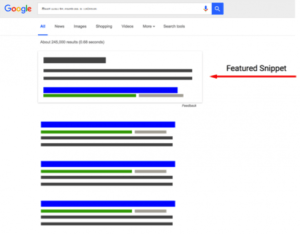(Google)-SEO is one of the most dynamic disciplines in online marketing. In recent years, Penguin 4.0, Mobilegeddon & the RankBrain update have resulted in major adjustments to the Google Core Algorithm. However, if you look at the current developments, the future years in the SEO landscape will certainly not be boring. In today's article "The future of Google SEO" I describe the current developments in the Google SEO world and what implications this has for online companies. This is my own opinion, which I have abstracted after analyzing the current developments.
Featured Snippets - The winner takes it all
A featured snippet is a highlighted result in the SERPs that is in position 0 (the best possible position). Featured snippets are displayed in particular for queries. Estimates show that currently only around 10% of search queries Featured Snippets be played out.

- The content played out in the featured snippet is an extracted summary of a web page, which the Search query answered. The CTR on a featured snippet increases by in some examples 1000%. The integration of featured snippets significantly changes the click behavior so that position 0 receives a significantly larger proportion of clicks. This inevitably leads to a significant reduction in the click rate for all other results.
Another effect of featured snippets is that the search query is already answered by displaying the relevant content without having to click on the featured snippet. Google wants to enable better user behavior with featured snippets. According to Google's logic, this is only possible if users remain in the Google cosmos and are not redirected to other websites. Similar effects have, among other things Answer boxes and the Knowledge Graph.
Voice Search: Voice is beautiful
Voice search refers to search queries that are carried out using voice input. This can be done either via smartphone or PC and, more recently, via digital home assistants (e.g. Google Home). Search behavior is changing dramatically. Instead of generic termssuch as "gifts", there are longer search queries, which are often formulated as questions. If voice search becomes established, this will mean that website operators will have to provide more specific content in order to rank for the respective search query. Figures from the USA show that already 20% of search queries can be entered by voice. However, it is not only the search behavior that changes, but also the display of search results. It can be assumed that only a limited number (<3) of search results will be displayed.
This would mean that only the first results would be visible in the SERPs. Search results that are not represented in the first three results will have to make do with an even smaller share of search traffic in future. Voice search therefore favors a Winner-takes-it-all market.
RankBrain - From mobile-first to AI first
Back in 2015, Google announced the use of RankBrain, a partial algorithm based on artificial intelligence and machine learning that answers search queries that have never been asked before.
Around 4 billion search queries are made every day, of which around 15% have never been made before. Today RankBrain already the third most important ranking factor.
The effects of RankBrain can only be guessed at. It is assumed that the search results will be further personalized by RankBrain's learning ability. The importance of rankings will decrease due to the personalization of search results.
Another challenge for Website operator is that RankBrain does not recognize any ranking factors. RankBrain is a self-learning algorithm, so that prescribed Ranking factors become obsolete.
Google also does not know the factors that the RankBrain algorithm uses for the presentation of search results. It can be assumed that the user experience will be an important factor in the evaluation of search results.
The verticalization of search
Google is not only competing with conventional search engines such as Bing & Yahoo, but also increasingly with verticalized search engines. Google competes with Amazon for product searches, with Pinterest for image searches and with Facebook & Linkedin for people searches. More than 50% of internet users no longer start their product search on Google, but directly on Amazon. Amazon is therefore already the largest product search engine. This means that online retailers need to shift their focus from Google SEO to Amazon SEO in order to reach organic visitors in the future. But Google is also losing importance as a traffic supplier for other business models. Publishers already reach more website visitors via Facebook than via Google. It seems that in a platform economy, the need for search queries via traditional search engines is decreasing.
The search is not necessarily less than before. However Verticalized search engines preferred by horizontal search engines (e.g. Google).
Mobile-Search
In a mobile-driven world, not only is the device used changing, but the search behavior of users is also inevitably changing. Mobile devices are used in particular for local search queries, such as "vegan restaurant Berlin". The presentation of search queries is also changing dramatically: the first organic results are not visible "above the fold". This is a clear disadvantage for the generation of organic traffic for webmasters, as the organic results only become visible when scrolling. As a result, the click-through rate on AdWords ads increases. In addition, the search queries submitted via mobile devices are also changing compared to desktop & voice searches. For example, shorter search terms are entered in mobile searches, which means that Longtail keywords hardly appear in the mobile search.
There is also a shift in attention on mobile devices. Mobile users spend 88% of your time in apps and only a fraction of mobile usage is actually spent in web browsers.
AMP & Google Buy Button
Since the beginning of 2016, the letters "AMP" have been displayed in some mobile search results. AMP stands for Accelerated Mobile Pages. AMP are HTML-restricted websites that are served directly via the Content Delivery Network are played by Google. This means that websites load quickly even with low bandwidth.
When an AMP page is called up, the actual page is not loaded, but only a copy from the Google cache.
For example, it is not possible to call up another subpage after calling up an AMP-supported page. This means that the content becomes commoditized and cannot be monetized through advertising. In addition, AMP means that users no longer leave the Google ecosystem. Google is probably pursuing a similar principle with the Google Buy Buttonwhich is designed to enable shopping directly from Google results.
Conclusion: The future of Google SEO:
SEO has been one of the most dynamic online advertising opportunities for over 10 years. In the future, the dynamic will increase rather than flatten out. Each of the points mentioned (featured snippets, RankBrain, voice search, AMP & verticalization of search) will bring about huge changes in the search landscape. If we abstract the different changes, we arrive at the following changes:
- The verticalization of the search results in a clear demarcation of the search engines. Amazon will become/remain the most important product search engine. The search for people will certainly shift more and more to Facebook & Linkedin and vacation trips will be searched for directly via Booking.com. In the future, Google will largely be a search engine for questions & answers. The most lucrative search queries will no longer be answered by Google. For online-based business models, this means that a multi-SEO platform strategy should be pursued in future in order to make contact with potential new customers at all touchpoints.
- The increased use of mobile and voice search, as well as the impact of the Knowledge Graph, will lead to a significant shift in traffic to the first three results.
- The use of RankBrains means that there will no longer be any universally valid ranking factors in future. As a result, Google SEO will become even less predictable, making it even more difficult for companies to make "pro-SEO" investment decisions.
What does this mean for online companies?
In order to continue to operate a successful online business model in the future, a switch should be made from the sometimes narrow-minded SEO strategies to a brand-building strategy in order to increase direct traffic. A multi-platform strategy should also be followed to diversify visitor sources.

